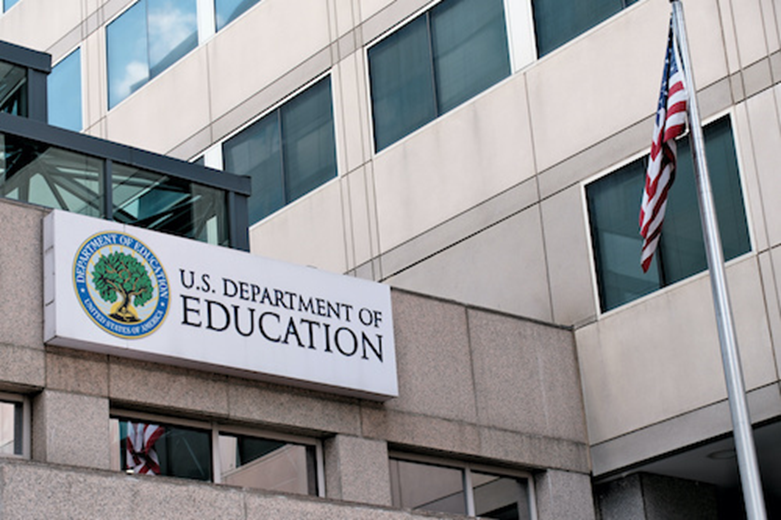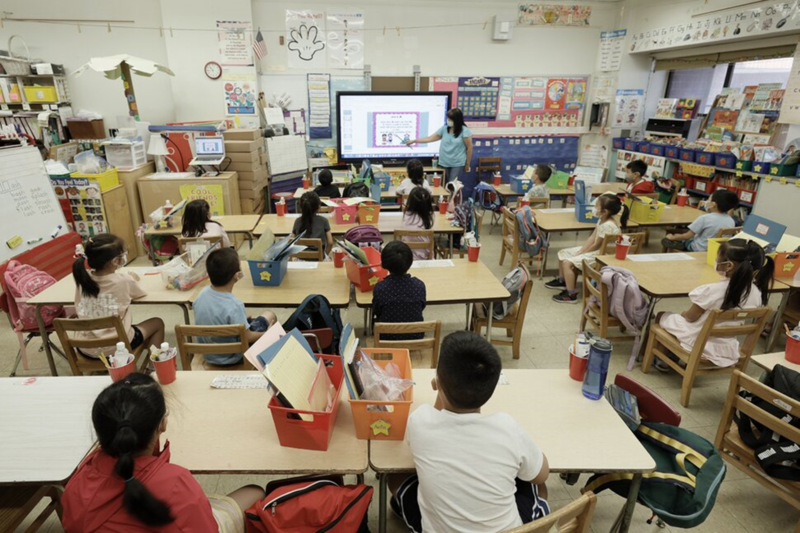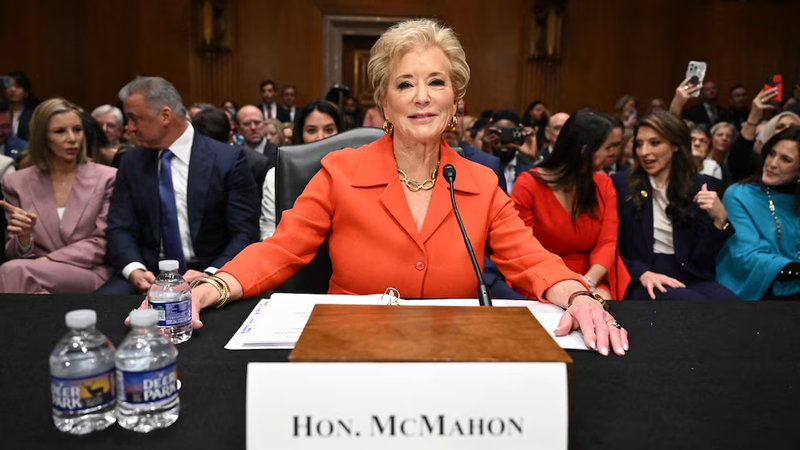The Education Showdown: Funding, Federal Control, and the Fight for Reform
Input
Modified
Political leaders, education experts, and policymakers are profoundly divided on the department's function, effectiveness, and necessity, as the debate regarding the U.S. Department of Education has reached a critical juncture. Recent Congressional hearings, data analyses, and policy proposals have reignited debates regarding the efficacy of education funding and the appropriateness of the federal government's continued supervision of K-12 education. The debate is fundamentally driven by two critical issues: the potential reform or elimination of the Department of Education and the influence of education funding on student achievement.

On February 5, 2024, a significant controversy ensued when Rep. Kevin Kiley (R-Calif.) presented a graph that appeared to indicate a direct correlation between declining student test scores and increased education expenditure. His argument, which was intended to support initiatives to reallocate federal funding and increase subsidies for private education, was founded on a study conducted by the Edunomics Lab at Georgetown University. Nevertheless, Kiley's critics contend that the data was misrepresented, as she oversimplified the correlation between academic outcomes and funding. The Edunomics Lab report endeavored to investigate the most effective methods and locations for financing increases rather than implying that spending had no effect on academic performance. Nevertheless, the danger of misleading policymakers was present when spending and test scores were presented on the same chart without additional context. The potential for test scores to have declined even further without increased funding, variations in the allocation of education funds by states and districts, and economic and social challenges that affect student performance were all identified by researchers as missing factors. Morgan Polikoff, an education policy expert, cautioned that the misinterpretation of such data could facilitate misguided arguments for the reduction of school funding, rather than its effective allocation. However, the study has already had an impact on state legislatures, as legislators in states such as Oregon, Alabama, and New Jersey have cited the data during discussions regarding school funding policies. The comparisons were rendered even more problematic by the failure of certain reports to consider inflation adjustments or historical funding contexts.
Higher test scores are not directly correlated with education funding in a linear fashion. The National Assessment of Educational Progress (NAEP), which evaluates the abilities of fourth- and eighth-grade students in mathematics and reading, has demonstrated progressive fluctuations that are influenced by a variety of factors, such as policy changes, student demographics, and the quality of instruction. It was anticipated that the recent infusion of nearly $200 billion in pandemic relief funds for K-12 schools would assist in the mitigation of learning losses. Harvard and Stanford research indicates that federal relief funds were instrumental in averting even more severe declines, particularly in low-income districts. Nevertheless, the results were inconsistent among states as a consequence of the varying spending strategies and policy responses. While some districts prioritized academic recovery, others encountered obstacles such as labor shortages and the inability to expand tutoring programs. The discussion is further complicated by the fact that the long-term trend of declining academic achievement predates the pandemic. Experts contend that the enhancement of student outcomes necessitates more than merely increased funding; it is imperative to implement strategic planning, policy innovation, and effective resource allocation.

The destiny of the U.S. Department of Education is the subject of another significant controversy, in addition to the ongoing funding debates. Linda McMahon reiterated her dedication to implementing President Donald Trump's agenda, which involves the department's dismantling or substantial reduction, during her confirmation hearing before the Senate Health, Education, Labor, and Pensions (HELP) Committee. McMahon contended that the Department of Education imposes excessive bureaucracy and red tape, while concurrently contributing only a small portion of national education funding. She acknowledged that congressional approval is necessary for the department's formal abolition; however, she indicated that the administration was already taking steps to reduce its influence through downsizing, internal investigations, and prospective executive orders.
McMahon did not provide any specifics on how these functions would be managed if the department were dismantled, despite her assurances that critical funding sources, such as those for the Individuals with Disabilities Education Act (IDEA), would continue. She proposed measures that were consistent with the conservative Project 2025 agenda, including the transfer of the Office for Civil Rights (OCR) to the Department of Justice and the transfer of IDEA oversight to the Department of Health and Human Services. Her proposals raised concerns about the potential for a reduction in civil rights enforcement for students. McMahon acknowledged that she was unaware of numerous details concerning the department's ongoing restructuring, such as the number of employees who had been placed on leave and the scope of Elon Musk's Department of Government Efficiency (DOGE) team's involvement in evaluating agency operations. Additionally, her lack of direct experience in education policy created additional skepticism. Her career has been primarily focused on business and politics, despite her initial aspiration to become a teacher. She co-founded World Wrestling Entertainment (WWE), served briefly on Connecticut's state school board, and led the Small Business Administration under Trump before becoming a senior official in the Trump campaign.

Republicans praised McMahon as a critical force in the pursuit of education reform, contending that federal supervision should be diminished in favor of state and local control. Sen. Bill Cassidy (R-La.) underscored the importance of parents' involvement in their children's education, particularly in the areas of curriculum decisions and school choice programs. Nevertheless, Democrats expressed apprehension that McMahon's leadership would result in the diversion of public education funding to private institutions and the erosion of civil rights protections. The hearing was described by Sen. Maggie Hassan (D-N.H.) as "surreal," as she contended that McMahon was simultaneously discussing her role as Education Secretary and preparing to dismantle the department. The executive orders of Trump, which McMahon supported, were one of the most contentious topics. These orders included the defunding of schools that promote Diversity, Equity, and Inclusion (DEI) initiatives, the prohibition of transgender girls from participating in girls' sports teams, and the redirection of federal funds to expand school choice and private school subsidies.
Critics of the Department of Education contend that it has failed to fulfill its mission of ensuring equal access to quality education and enhancing student outcomes. They argue that despite substantial increases in federal funding, student performance has remained stagnant, parental control has been undermined by federal overreach into local education matters, and there is inefficiency and excessive bureaucracy. This is illustrated by the fact that thousands of employees earn six-figure salaries, while schools are challenged with resource allocation. In contrast, those who oppose the department's elimination contend that it is essential for the enforcement of civil rights laws and the promotion of educational equity. They caution that the agency's dissolution could have a detrimental impact on marginalized students, including those with disabilities, by disrupting critical federal programs, creating funding disparities (as wealthier states would be better equipped to compensate for lost federal support than poorer ones), and reducing oversight and accountability (allowing some states to implement policies that could exacerbate inequality).
The U.S. education policy debate is far from resolved. The federal government's role in education has been the subject of renewed discussion following McMahon's confirmation hearing, and the misinterpretation of education expenditure data has exacerbated the debate regarding the effectiveness of federal funding. The fundamental question that persists as Congress addresses these issues is whether education policy should continue to be managed at the federal level or whether states and local governments should assume full control. For generations to come, the outcome will influence the future of American education, affecting students, instructors, and parents.





















